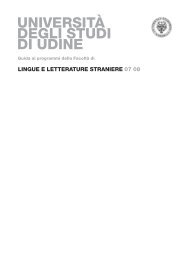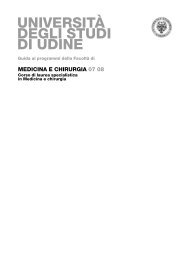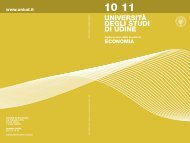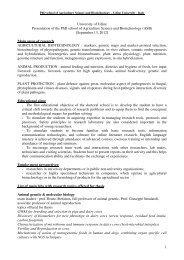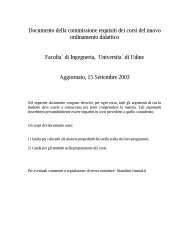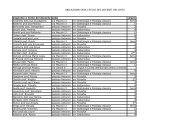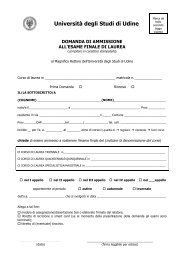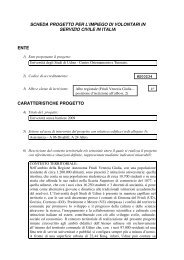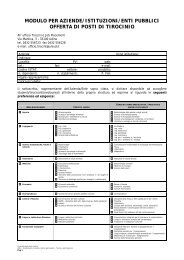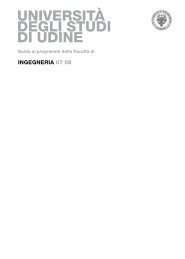â¢GUIDA ECONOMIA 07-08 - Università degli studi di Udine
â¢GUIDA ECONOMIA 07-08 - Università degli studi di Udine
â¢GUIDA ECONOMIA 07-08 - Università degli studi di Udine
Create successful ePaper yourself
Turn your PDF publications into a flip-book with our unique Google optimized e-Paper software.
226 prospectus u<strong>di</strong>ne<br />
(Chapter 21); Firm supply (Chapter 22);<br />
Industry supply (Chapter 23); Monopoly<br />
(Chapter 24); Monopoly behaviour (Chapter<br />
25); Oligopoly (Chapter 27).<br />
Bibliography<br />
- H.R. VARIAN, Interme<strong>di</strong>ate micoreconomics,<br />
Norton, New York, 1999.<br />
MICROECONOMICS<br />
ADVANCED COURSE<br />
Prof.ssa Clara Graziano<br />
Aims<br />
To provide the student with a good<br />
knowledge of microeconomic theory at<br />
an advanced level. The course topics deal<br />
primarily with company theory, consumer<br />
theory and the pricing mechanism<br />
in imperfectly competitive markets.<br />
Contents<br />
I Module<br />
Technology<br />
Profit maximization<br />
Profit function<br />
Cost minimization<br />
Cost function<br />
Utility maximization<br />
Choice<br />
Midterm exam.<br />
II Module<br />
Demand<br />
Consumer surplus<br />
Uncertainty<br />
Competitive markets<br />
Monopoly<br />
Oligopoly<br />
Exchange<br />
Final Exam.<br />
Bibliography<br />
Textbooks will be recommended during<br />
the course.<br />
Evaluation<br />
Paper presentation 30%, midterm and<br />
final exams 70%.<br />
MONETARY POLICY<br />
Prof.ssa Patrizia Tiberi<br />
Aims<br />
To supply evaluation procedures on the<br />
role of the State in managing the economy,<br />
both in the short and in the long run,<br />
stressing the scope of Monetary Policy in<br />
terms of targets and instruments. The<br />
structure and functioning of the Institutions<br />
built to this purpose are <strong>stu<strong>di</strong></strong>ed in<br />
the final part of the course, paying particular<br />
attention to the role of the Central<br />
European Bank.<br />
Contents<br />
Theoretical lectures on the effects and the<br />
scope of Economic Policy, in particular of<br />
Monetary Policy, will be coupled with<br />
other lectures, more empirically oriented,<br />
dealing with the role of the most important<br />
Institutions (in particular the ECB).<br />
As an introduction, some tutorials will<br />
create a link between Macroeconomics<br />
and Economic Policy, adopting a ‘problem<br />
solving’ perspective, in connection<br />
with contemporary issues. In the final<br />
part of the course, some applied topics<br />
will be chosen to develop a <strong>di</strong>scussion on<br />
relevant themes for Monetary Policy.<br />
After considering the main instruments<br />
and methods of Monetary Policy, in a<br />
general framework, particular attention<br />
will be given to EU integration with a<br />
focus on EU enlargment. To conclude,<br />
the role of the ECB will be <strong>stu<strong>di</strong></strong>ed, both<br />
in terms of scope and capacity to deal<br />
with financial and monetary issues.<br />
Pre-requisites<br />
Macroeconomics; Economic Policy.



